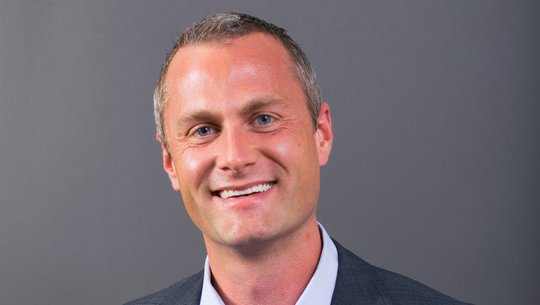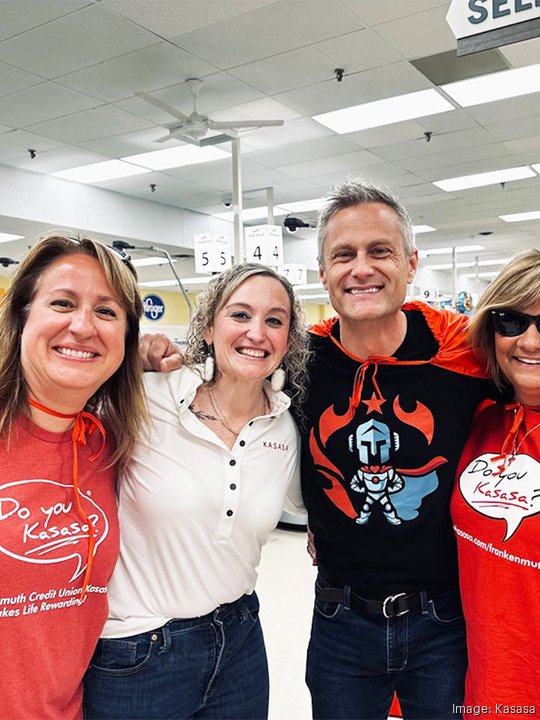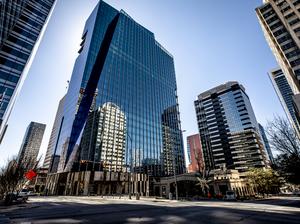Austin fintech company Kasasa has over a dozen job openings posted on its careers website, and it's looking forward to potentially being acquired in the next few years.
But, until recently, it would have been hard to imagine that type of optimism. In fact, it looked more like Kasasa would get squeezed out of existence.
Let's flashback to 2014.
Kasasa built a business on helping community credit unions and small financial institutions attract more customers by developing more competitive products and marketing campaigns, as well as providing deeper analytics on why some consumers opt for big banks over local ones.
After years of strong growth and guerrilla marketing campaigns at gas stations, the company was taking off. But just as it had momentum, officials at the Federal Deposit Insurance Corp. started drafting new rules that would force Kasasa to operate as a deposit broker. That comes with regulations, insurance rules and fees that would eat away at the business.
"It's just really bad. It would have raised the insurance premium cost for our clients. It would have made our deposits more expensive for them. It would have marked them as risky deposits," CEO Gabe Krajicek said. "So nobody would want our deposits if they'rebrokered deposits. So the FDIC said we had to shut down Kasasa.com and no longer cooperatively market in any way."

The company launched a lobbying campaign in hopes of getting Congress to help. While it couldn't get any laws over the finish line, the dialogue helped nudge the conversation forward and the FDIC later provided guidelines that allowed the company's marketing to continue.
Kasasa leaned into its database of millions of consumers and marketing analytics and essentially became a fintech marketing machine. It got acquired by private equity firm The Riverside Company. The business had recovered.
But, in 2019, the FDIC revisited its laws, and it appeared to be ready once again to force Kasasa to become a deposit broker.
Then came the pandemic. When people largely stopped walking into banks and opening new accounts, Kasasa was hit hard.
"In 2019, it was looking like ... we can lose the whole business, and that was happening at the exact same time as shutdowns were occurring all across the nation," Krajicek said.
While many tech companies were booming as the world retreated to a mostly digital reality, things were looking grim for Krajicek.
And his team knew it.
Kasasa, like many businesses, shifted its employees to a work-from-home setting. Things started going downhill fast.
"Unfortunately, the trajectory of the company has gone quite downhill since 2019, and the pandemic only accelerated that," one employee posted to job reviews site Glassdoor.
As some fintechs were raising big funding rounds and offering better salaries than Kasasa could afford, Kasasa's employee attrition rate climbed to 50%, Krajicek said. Layoffs soon followed. And, along with that came a slump in its net promoter score, which fell as low as negative 12.
The company was, again, at a crossroads.
It sent postcards to the financial institutions it had been working with through the years. The cards came with a drinking straw, saying "we sucked."
The company cut much of its marketing team and outsourced it to a local firm started by a former Kasasa employee. Krajicek declined to cite specific numbers, but state filings show the company laid off 59 Travis County employees in late February this year.
"It's not something, as a CEO, you're ever excited to go do it," he said. "It's feels like failure for sure to be very clear."

But the move freed up overhead and allowed the company to focus on its frontline team that works directly with credit unions and banks.
Meanwhile, Krajicek wanted to find a way to bring the excitement back. And that meant bringing the team back to the office.
Kasasa also needed fresh products, so it brought its developers back first. That team had been trimmed significantly, but Krajicek said those who remained went on a tear, building new products in record time and even updating its middleware, which the company had further down its product roadmap, without even being tasked with it.
"They nailed that deadline. And then they nailed the next one. And then they nailed the next one," he said.
Krajicek said he had been all-in on remote work, but after seeing the efficiencies of having teams back in the office, he decided it was time to bring human connections back.
The recovery means that Kasasa is once again building up its team. It plans to add roughly 40 new people through the rest of 2024, and it's offering employee equity that could allow for its team to benefit from being acquired.
"We have a culture that's built on the idea that it's all hands on deck and if you want to add value, you could be the janitor or you could be the CEO," he said. "It doesn't matter. The best idea floats to the top."
The extent of the layoffs in the marketing department have been clarified.








